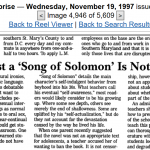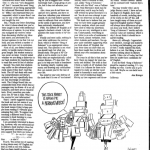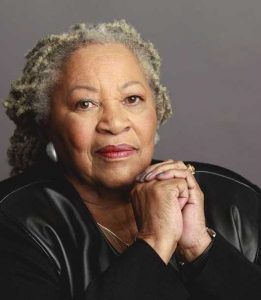Joie Brunger wrote a few responses to the removal of Song of Solomon in The Enterprise. We reached out to her and she agreed to answer some interview questions for us.
Joie Brunger’s submitted personal history prior to interview question responses.
History:
My great great great grandfather on my Grandpa’s side helped write the anti-slavery Kansas Constitution that got hijacked during Bloody Kansas.
A great, great Uncle on my Grandma’s side had a KKK cross burned on his front lawn because he hired a Black man for wages. I believe it was in Trenton but know for sure only that it was in New Jersey.
My Grandpa was a young doctor in Kansas when he heard a sharecropper needed medical help. Grandma went with him. On their way home, three hooded men on horseback with sawed-off shotguns blocked their Model T as it approached a bridge. Without a word, the Klansmen motioned with their shotguns for Grandma and Grandpa to get out of the car. One of the Klansmen kept his shotgun pointed at them while the other two disassembled the car (easy enough with a Model T) and threw the parts into the water. Then they got back on their horses and spoke for the only time: “This time is was your car. Next time you help a ni**er (changed for website content) it’ll be your wife.” I had a horror of the word before a lot of people thought twice about it.
Grandma and Grandpa went on to have kids, and when my mom was about 8, they were on a trip somewhere in the South. They’d stopped at a diner, and Mom got a drink from the water fountain. A white man went up to her and told her she wasn’t allowed to drink from it, pointed to a sign, and said the fountain wasn’t for her, it was for “coloreds.” Mom looked down at her dress and said, “But I’m wearing colors.” They left the diner.
When I was 6 or 7, my grandparents had a housekeeper who called herself “Happiness Smiles.” She was in some group whose beliefs you’ll hear about shortly. She was getting her Master’s Degree from Columbia University, had to go into the city for some paperwork, and I must have asked to go — I got to go with her. I was excited to go on a subway with a real adult — not like with your parents or a relative.
When we got on the subway, she wouldn’t sit next to me and sat across the (very wide to me) aisle. I was scared. I wanted to sit next to her and didn’t understand why she wouldn’t’ sit with me. She said it wasn’t proper for a black woman to sit next to a white girl in public. I don’t remember anything else about that trip, only that I was scared and my skin color meant that this wonderful lady wouldn’t sit next to me. I knew it wasn’t right, but how could an adult be wrong?
Mom told me when I asked about it some years later that the group she was a part of did not believe in the equality of the races. She was getting her Master’s from Columbia, for Pete’s sake.
Those seemingly insignificant snippets of racism . . . . maybe another time.
Fast forward to college. I was an English Major and did my senior thesis on Huck Finn. Getting away from the self-serving homo-erotic impositions on the novel, Jim is the only real man throughout, the only one who genuinely loves Huck, the only one who teaches Huck what fathers ought to teach their sons. White men are sniveling cowards, thieves, con men, narcissists, etc. Huck Finn is a total indictment of White culture, and “All right then, I’ll go to hell” one of my favorite lines in literature. Huck’s coming of age is when he goes against his “family,” convention, and the law to do justice to another human being, and the character that so many people dismiss without a second thought is the only genuine hero in the novel. It kills me that Jim’s skin and vocabulary blind people to his soul. It’s a double whammy when the people who are blind are the very ones demanding everyone else do for them what they don’t do for Jim.
I was an English major in college. However, I never read anything outside of school until halfway through 8th grade- nada – no Nancy Drew, no nothing. I picked up my older brother’s English book, “Poems to Remember.” It was small and had a cool cover. The first section was full of funny and entertaining poems that were short and easy to memorize. The next section’s first poem woke me up to literature, to the idea that an author’s words could speak to me — not a class, not a group, but me — more intimately and lovingly than I’d ever been spoken to before. It was Langston’s Hughes’ “Mother to Son.” I memorized that one, too. I can’t tell you how many liberals raise their eyebrows when I talk about that poem, as if my experience was somehow “off,” as if I couldn’t really understand the poem body and soul because I don’t have the right color skin.
Interview Questions:
1) Prior to our interview you suggested reading Tocqueville’s “Tyranny of the Majority.” How you feel Tocqueville’s writing relates to the 1997 removal of Song of Solomon from the AP reading list?
I believe it is tyrannical to REQUIRE anyone to experience or witness pedophilia, incest, bestiality, sex as a meaningless bodily function or rape, drug abuse as a norm, and the sustained physical and emotional abuse of others. To intellectualize and justify brutality in the name of art or one character’s search for or journey toward anything — I believe meets the definition of propaganda more closely than it does education.
The tyranny of the intellectual elite requires that students accept their redefinition of formerly accepted cultural norms. A respondent to my letters called anyone who shared my opinion a racist. I invited her to tea. She came, we had a pleasant conversation, but she said I was a racist because of my opinion about the book. No straying from “correct” opinions allowed. Totalitarian much?
2) In one of your letters to the editor of The Enterprise you question the literary merits of Toni Morrison. She went on to earn a Nobel Prize specifically for her writing in Song of Solomon. Do you have an opinion on how Nobel prizes are given out?
Yes, I do. Conservative voices are blacklisted in literary circles. It’s impolite to point out that literary prize winners will be minority, female, gay, transgender, from a non-Western culture (two or more even better), or will have adopted a life perspective focused on one of the above. Graphic violence or sex is practically a requirement. He or she will have political views quite similar to the other recipients, believe that truth is relative, and be a functional if not actual atheist (moral relativist). The list of authors who’ve won in the past few decades share a similar world view ad infinitum, one that weighs their work down with the issue du jour.
3) Song of Solomon covers the complexities of real life issues for black people in America. Do you have any recommendations as an alternative to Song of Solomon?
I vehemently disagree with that statement. If a white person had written “Song of Solomon” as a picture of Black life in America, they’d be figuratively lynched and branded an outrageous racist. Abuse, narcissism, pedophilia, incest, and bestiality are (not rare enough) horrors of human life, not hallmarks a particular community. I do not believe that Blacks in America have it any different from Jews in Nazi Germany or Armenians or Gypsies or overseas Chinese in theirs, but there are differences, not in how the groups are treated but in how they respond. Nothing justifies or excuses inhumanity. Not skin color, poverty, wealth, or privilege. Nothing. Not even art.
4) AP criteria is selected by teachers based on the idea that the content would be covered by college age freshman and sophomores. Do you think Song of Solomon is appropriate at a college level or should it not be taught in academia? If not why?
I think most of what is taught in university literature classes these days is propaganda, not critical thinking. When 95% of professors live their lives in an echo chamber of leftist thought, what else could be expected? When those who might offer a different perspective are denied tenure, how else could it be?
I visited China in 1979 (two years after it opened up after 30 years of being closed to Westerners). When we asked students questions, we got the same answers almost verbatim — from elementary school to university, from the north to the south. I didn’t speak Chinese, but many in my group did, and the translations were accurate. It scared the tar out of me – how could a government exert so much control over the minds and thoughts of so many? I find it deeply frightening to hear so many Americans saying the same ideas with the same words. There is no longer even the variety of opinion there was when I was in elementary, junior, and high school.
I read “Animal Farm during a high school summer, so I was never told what the book was about. I thought it described the United States. When others said it was about the Soviet Union, it didn’t change my mind. The situation has only gotten worse since then: no one is permitted an opinion different from Critical Race Theory, feminist theory, Macro-evoution, gender politics (statements of biological fact about the male and females sexes is grounds for dismissal from class and social ostracism), truth as an individual construct, Whites as privileged, Blacks as victims, poverty as an excuse for criminality,…. It’s Twilight Zone eerie to see and hear it in my own country, and not after anything like the Cultural Revolution. We’re giving up our rights to independent thought without so much as a whimper. Much of what passes for independence is cultural groupthink.
5) How much autonomy should educators have in selecting their curriculum? Should curriculum be more closely regulated by the government to prevent certain works of literature from being taught?
I think the government already regulates the curriculum far too much. I also believe it fails to teach both sides of most historical issues. Reading the AP American and World History standards was depressing: Americans: evil abusers of others and the environment; tribal populations and third worlders: virtuous, egalitarian, living in harmony with nature. One-sided bunk. Ignoring the good is just as misguided as ignoring the bad. For example, people use the 3/5 compromise as an indictment of the writers of the Constitution. As a history major, you should know if you don’t already that the Southerners were the ones fighting to have slaves count as a a full person for the census — it would give them a lock on the House of Representatives and the electoral college. Abolitionists fought and fought hard for the 3/5 clause so there would be some hope of legislating an end to the abomination of slavery. As it was, southern states had a lock on the federal government for how long? The 3/5 clause was the first foot in the door against slavery, and to have it’s creators maligned as racists is historical malpractice. Political figures are lionized; engineers, mathematicians, artisans, and inventors are treated as secondary to heroic social justice warriors. Read some of W.E.B. Dubois’s less famous writings, and you’ll find that he and Booker T. Washington were not the polar opposites presented in today’s grossly and inaccurately simplified history lessons.
6) Has your opinion on this issue changed since 1997?
Yes. It has gotten stronger. Anyone who doesn’t kowtow to the artistry of foul language, public simulations of sex, and the glories of offending those who believe liberty is not license is branded hateful, racist, immoral, etc. The first amendment is in shreds, most notoriously in schools and universities.
7) If you could change anything you said or handle the situation any differently what would you do?
I would tell myself it was ridiculous to think an AP student might be competent to discuss the literary merits or demerits of the book. Unfortunately, suggesting it wasn’t good literature would have been social suicide for any student because of the tyranny of overbearing, loud, proud, and intolerant intellectual bullies. Sadly, teachers are often among them. I also wish I had the chance undo what would be many students’ first exposure to a nursing mother – that of an abused mentally ill woman using her child for sexual gratification and escape.
Nursing is a physical act that can bring moments of bonding and joy that are physical as well as emotional — and to plant the idea that there might be something disgusting or wrong with those feelings or that they might lead to something so wrong and disgusting — I hoped and prayed something would redeem the book, something to give that opening some purpose. Nope — just an incredibly well written betrayal of love. Seems to be a theme of Morrison’s.
Added note:
PS I think the teacher was a coward for assigning it over the summer. And for asking students to avoid graphic language in answering questions about the book. How hypocritical can you get? Then again, some pigs are more equal others, and getting more equal every day.
To the Editor or The Enterprise.
Brunger, Joie. “It’s Not Censorship to Suggest a ‘Song of Solomon’ Is Not an Appropriate School Text.” The Enterprise, November 19, 1997.
It’s Not Censorship to Suggest a ‘Song of Solomon’ Is Not an Appropriate School Text:
“To the Editor:
There has been a lot of talk about school improvement lately. I’d like to share an improvement Leonardtown High school believes it implemented several years ago in advanced placement English classes.
The school added to its assigned reading a book by Pulitzer Prize winning author Toni Morrison titled “Song of Solomon.” As taught, it is about the main character’s odyssey to self-awareness. As a former English major, I find that focus entirely too narrow for a book full of religious allusions, psychological labyrinths, historical allegories, economic and cultural ironies, and intriguing use of symbolic language.
But regardless of the book’s debatable literary merits, parents might want to know about the content. It includes pedophilia, necrophilia, incest, sexual intercourse and use of illegal drugs as normal recreation, graphic references to oral sex, allusions to bestiality, and near-continual explosions of languages that could get students expelled if used in a classroom. One test question about the book warned students before answering “You do not have to be graphic.”
“Song of Solomon” details the main character’s self-indulgent behavior from boyhood into his 30s. What teachers call his eventual “self-awareness,” most readers would likely consider to be his growing up. Where some see depth, others see merely the end of shallowness. Some are uplifted by his “self-actualization,” but do they not account for the devastation caused by the way he lived his life.
When once parent recently suggested that the novel was not an appropriate text for adolescents, a teacher accused her of wanting to ban the book. It is not censorship, however, to suggest that a novel is not an appropriate school text. This is not about students reading the book, it is about whether students should study it as part of the curriculum. An administrator did say he believed teachers should receive more training on how to present the novel- expending more of the school system’s limited resources to teach this particular book. Why? Students can thoroughly explore every aspect of literature without it. If the goal is to have students look beyond illegal, irresponsible and degrading behavior to “find meaning,” this book succeeds. But I don’t believe schools need to teach that particular skill.
One parent tried to get the book replaced with another selection from the advanced placement list and failed, but she is currently appealing. If we want school literature to expose our students to a world of casual sex, recreational drugs, profanity and various sexual perversions, so be it. My guess is that we do not. Please let our school board know what you think.”
You May Not Have Been Taught Genuine Literary Analysis
“To the Editor:
This is written in response to Leonardtown senior Mike Williams (Dec. 5), who was “very disappointed” that I “accused the novel ‘Song of Solomon’ of not being appropriate for Advanced Placement level classes.” Mike, I am impressed that you responded, which is more than I can say for any of the adults who chose and taught the text.
But, I found your letter disturbing for what it shows about how you’ve been taught to deal with intellectual differences of opinion. In your letter, you maligned my motives rather than discussing whether my ideas had merit; you attributed ill-informed opinions to me that I do not hold; and you refuted a number of points that were not in contention.
First of all, you defend students’ ability to handle mature themes at great length. But Student maturity was never an issue. I merely asked whether we are doing a disservice to our best students by requiring them to read this novel in lieu of another.
Second. You claim that students may suffer on the advanced placement exam if they don’t read this book. The AP test deals with reading comprehension and literary analysis and very specifically does not test knowledge of individual work. The College Board lists recommended texts from which literary passages may be drawn- it is not all inclusive, and there are no required texts. Every assertion you make about the AP test is false. What was the source for your information?
Third. I never suggested banning the book and am not aware of any student who has done so. Banning the book means trying to keep people from reading it (virtually guaranteeing they will). To suggest that teaching a different book in class amounts to book banning is non-sequitur, “it does not follow.”
I am genuinely interested in knowing, however, why you enthusiastically defend a book teachers chose but feel personally attacked when parents suggest that there are better alternatives. Why do you think teach———— better than ——– else’s?
Fourth. You accuse me of wanting to drag down every AP English student as well as my own children. Had you been taught rhetoric, you would know that that is an argument ad hominem, against the person, and does not address the issue at hand. It may be emotionally satisfying for you to suggest that I would knowingly hurt a large group of people, but it does not advance your case.
Also, since you do not know me and are not a parent, you have no idea how ridiculous your statement sounds. If you truly believe parents want to suffocate their own children in the sands of ignorance, you have been extremely miseducated.
Fifth. You defend AP English as if against a barbaric attack. I did not question the many merits of AP English.
Finally and most sadly, nothing in your letter address the central issue, which is whether “Song of Solomon” is an appropriate educational text. The question is not what you should read, but what you should study. The goal of AP English is not to enable you to deal with what are euphemistically called mature themes- TV does that. The goal is to help you build a foundation for thinking clearly, making judgements and drawing only conclusions that can sustain you for the rest of your life.
You noted in your only defense of the book that it is one of “acclaimed literary merit.” So was “Gone with the Wind,” but that novel’s hold on literary value is tenuous at best, and unlike “Song of Solomon,” “Gone with the Wind” won a Pulitzer Prize. Toni Morrison’s book may be a good story and it may be fairly well written but great literature it is not. You do not even attempt to persuade me otherwise on that point.
This leads me to believe that you may not have been taught genuine literary analysis, which you could have used to rebut my assertions. That you are very intelligent is obvious. Unfortunately, everything in your letter is an echo of sentiments I have heard, almost verbatim, from other students and teachers. You appear quite confident in supporting what you think about AP English. But your letter does not show that you have been taught how to draw and defend your own conclusions about literature.
The irony in all this is that you believe I have no respect for your maturity and abilities. The truth is that I think so highly of AP students that I think it is a shame for them to be required to study an inferior novel mired in humanity’s muck and generally void of intellectual depth. Mixing up time segments and throwing in foul language and adult situations does not improve a book’s literary value. “Mature themes” should not be confused with “mature literature.”
You may wonder who I am to judge literary merit. I have an honors degree in English, have read hundreds of novels, including most of the works on the AP list, and have taught many of them as a college-level English teacher. People will always have differences of opinion about any book. But I believe “Song of Solomon’s” merits and educational value are minimal, which is why I do not think it should be required reading.
Above all, although, I appreciate your intellect, courage and maturity in stating and defending your point of view. I really enjoyed this book, believe it or not. But liking a novel denotes nothing about its literary quality. I like a lot of books, but that does not make them candidates for AP English.
If you do think “Song of Solomon” should be required reading, I’d enjoy finding out why. I invite you to give me a call. Maybe we can both learn a little more.”







